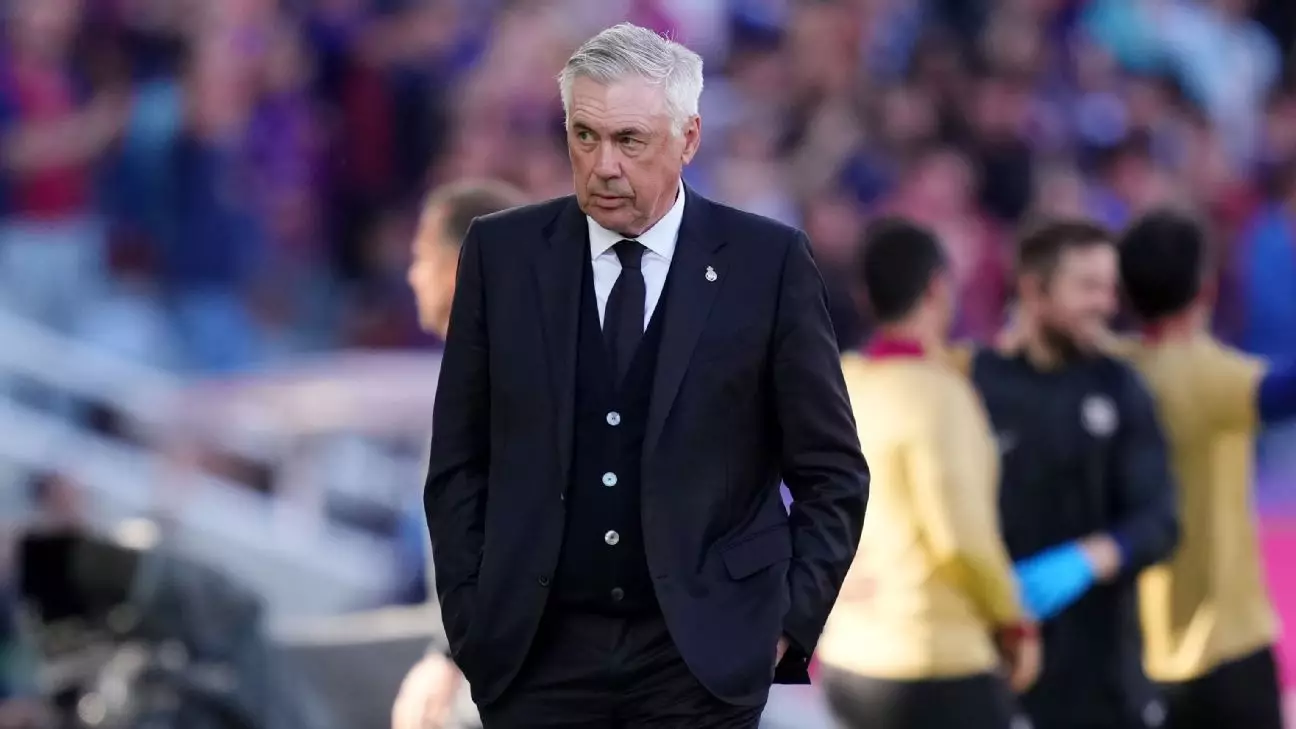Carlo Ancelotti’s announcement regarding his departure from Real Madrid inevitably invites a mélange of emotions from fans and commentators alike. Reflecting on his tenure, Ancelotti embodies a figure that transcends mere coaching; he resonates with a legacy steeped in monumental successes, yet is also characterized by the bittersweet nature of necessary change. While his decision to accept the role of head coach for the Brazilian national team marks a significant pivot in his career, it simultaneously opens the door for a much-required transformation at Real Madrid, a club renowned for its pursuit of glory.
Real Madrid is at a crossroads, and Ancelotti candidly acknowledges that the squad requires “fresh impetus.” After a season marked by underwhelming performances—exited from the Champions League and falling to Barcelona in the Copa del Rey—one must consider whether there is a systemic issue in need of addressing, or if the past successes have dulled the appetite for innovation. Ancelotti’s departure is not merely about his personal aspirations; it plays into the broader narrative that Real Madrid, a football giant with an indelible reputation, needs to re-examine its path forward.
A Departure with Dignity
One must commend Ancelotti’s professionalism as he navigates this complex transition. His commitment to finishing the season strongly before embarking on a new journey with Brazil underscores a level of integrity that seems increasingly rare in modern football. In holding his cards close to his chest, Ancelotti resists divulging too many details about his departure from Madrid, showcasing a respect for the club’s protocols and the emotional investment of its fans.
Addressing the speculation surrounding his awareness of the imminent transition, Ancelotti emphasizes that the relationship between a manager and a club is inherently personal and nuanced. Such comments reflect a profound understanding of football’s transient nature, further highlighting that every successful journey must find its conclusion at some point. His utterance that “football, like life, is an adventure” evokes a philosophical lens through which to appreciate both successes and endings. There’s no drama needed here; rather, there’s a benevolent resignation to the cycle of coaching.
A New Challenge Awaits
With Brazil on the horizon, a nation richly steeped in football heritage, Ancelotti faces an exhilarating challenge. To guide Brazil’s national team—a squad laden with both talent and expectations—will be no small feat. It offers him a canvas to paint new strategies and ideologies that contrast with his time at Madrid, pushing him to adapt to a different footballing culture and fanbase. His experience with high-stakes games, garnered in Europe’s elite leagues, will certainly serve him well in managing Brazil’s diverse arsenal of talent seeking to reclaim their World Cup prestige.
A glance towards history suggests that Ancelotti’s previous experiences may very well hold the key to unlocking Brazil’s potential. However, he inherits a squad still grappling with the heartbreak of past tournaments and is tasked with blending seasoned veterans and promising newcomers into a coherently brilliant unit. While he hints at the exciting challenge ahead, one has to wonder if Brazil’s high expectations for international success will weigh heavily upon him, much like the pressures he faced at the Bernabéu.
The Future for Real Madrid
As Ancelotti prepares to transition away from Madrid, the club must turn its attention to finding a suitable successor. Reports indicate a potential partnership with Xabi Alonso, a relationship rooted in respect and camaraderie. Such an appointment would not only honor the legacy of Ancelotti but also align with Madrid’s ethos of promoting former players to leadership roles. It’s a strategic gamble that hints at a revitalization plan, breathing new life into a squad that has, for too long, relied on remnants of past successes as justification for present performances.
Ancelotti’s parting words resonate with an awareness that a shift was necessary for both him and the club. His tenure is imbued with lessons, adaptability, and the harsh realities of high-level football. It serves as a reminder that no matter the past triumphs, progress can often require moving on, thus allowing new individuals to leave their marks on storied institutions. Ancelotti’s move may very well catalyze an exciting new chapter for Real Madrid, rekindling the age-old ambition for dominance on the footballing stage. As the footballing world watches, one can’t help but anticipate the narratives that shall emerge from this significant juncture.


Leave a Reply